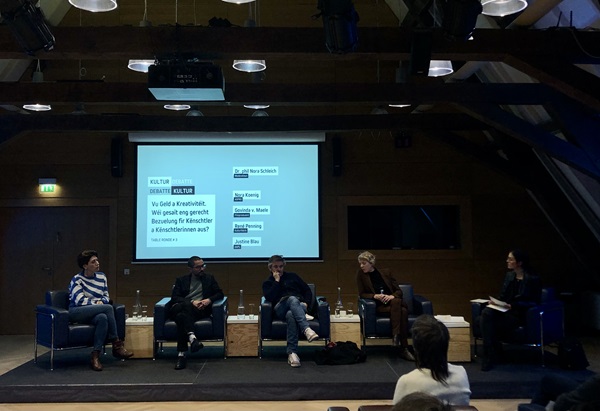 Credit: Otilia Dragan/Chronicle.lu
Credit: Otilia Dragan/Chronicle.lu
On the evening of Thursday 11 January 2024, Dr Phil Nora Schleich moderated the third culture debate (in Luxembourgish with live French translation available) at Abbaye de Neumünster (neimënster) in Luxembourg-Grund, discussing the notion of what a “fair payment” might look like for artists and performers in Luxembourg.
Doctor in philosophy Nora Schleich started the evening by thanking neimënster for supporting this series of exploration around culture in Luxembourg. The first roundtable discussion, which took place in June 2023, focused on access to culture. The second debate, which took place in October 2023, had a closer look at “ethical guidelines” in art and whether they are necessary or a problem (guidelines for diversity and inclusion, specific topics etc.).
The theme of the evening, namely fair remuneration for artists, was difficult because, as her grandmother used to say ‘one does not talk about money’. The question of money and creativity is, however, a very important one, especially in a small country like Luxembourg, where the art scene is relatively limited and artists may often struggle to live from their art.
Value is often placed on production in the form of money, which is necessary to survive. However, Nora Schleich noted that there is something “extra” in art, something that can inspire and bring new expression into the world. This is tied to emotion and can be subjective.
Art may sometimes seem like a “hobby”, however, professional artists exist and need to be taken seriously as a profession that takes long hours and long years to learn and specialise in. The four guests for the debate were Nora Koenig, President of the Luxembourg association for acting professionals (Association Luxembourgeoise des professionnels du spectacle vivant - ASPRO), Govinda Van Maele, a Luxembourg-based film director, René Penning, Director of the Esch-based Kulturfabrik cultural centre and Justine Blau, a visual artist and Co-President of the association of visual artists in Luxembourg (Association des artistes plasticiens du Luxembourg – AAPL).
Nora Koenig, ASPRO representative emphasised that the COVID-19 pandemic created a situation during which theatre directors and actors were not able to for a very long time. This was the moment when emergency prices had to be decided on, as certain people were unable to support themselves financially. This led them to start from scratch and set up a new system, a glossary for the very specific positions available in the theatre world and set detailed rates (a weekly price/ presentation price/ day price). They strove to direct this process taking into account the minimum salary for qualified professionals in Luxembourg.
Govinda Van Maele spoke earnestly about the local film and art industry and how lucky he was to have had parental support throughout his career. He explained that whilst he did not have formal schooling, he created short films with friends ever since he was a teenager in secondary school. A successful feature film selected by the Film Fund Luxembourg may mean a director would earn €100.000. “If one works fast, one can live well off of this, but if one takes several years to produce a new film, this sum does not ultimately suffice for a comfortable living.” He stressed that it takes new filmmakers five to six years to make a name for themselves and that during this time without a way to “live cheaply”, one could not make it.
René Penning noted that a successful artist he knows once told him how, at the end of the year and after many performances, they only make around 45.000€. This may suffice at the beginning of one’s career, but not if one plans on starting a family. “Often people don’t realise that independent artists have to pay 33% taxes, do not have any additional benefits or paid holidays. Artists have to live on much less [money].”
In Luxembourg, the culture ministry supports artists by offering grants and residences for artists. However, the discussion circled around the fact that that is good for the beginning of an artist’s career, but not of much help in the long run. Some face the issue of having to “stop or move abroad”. While the support is “absolutely necessary here because the audience is small,” Nora Koenig explained that Luxembourg is limited for theatre in particular as there are not enough people living here to be able to put on the same play several times on live off of that.
While discussing criteria and how a price would be set on art and creativity, Justine Blau explained: “We didn’t put [a price] on creativity, which can be very difficult to define but [we set a fee] on time and engagement, contact with the public […] This can be compared to other jobs such as architects or designers etc. To focus on ‘aura’ is not possible to set a price on the work.”
The discussions were spirited and created an exchange with multiple members of the audience.








